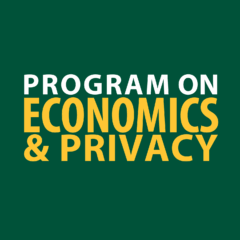The Program on Economics & Privacy (PEP) at George Mason University Antonin Scalia Law School invites applications for the 2019 – 2020 Privacy Fellowship. We seek authors to develop and present original work that focuses on the law and economics of issues surrounding the increasing regulatory scrutiny of online platforms. Issues of interest include, but are not limited to:
Total honorarium payments of $10,000 per paper will be available to those who fulfill all the obligations of the program, which are described in detail below.
- Submission of Research Proposal – Deadline of October 31, 2019.
Research proposals should include a statement of the issue to be addressed and the proposed methodology, as well as a discussion of the feasibility for completion by Summer 2020. Empirical project proposals should include a plan for obtaining suitable data. Proposals should be no longer than five pages (not including charts, graphs, or bibliography).
- Research Roundtable in Tucson, Arizona – January 17-18, 2020.
Selected authors will present well-developed drafts of their papers at a research roundtable co-hosted by the University of Arizona, and to be held in a serene desert setting in the Sonoran desert. Revised drafts should be no more than twenty pages (excluding charts, graphs, and bibliography), and represent substantial work beyond the proposal (e.g., preliminary statistical results). This research roundtable is a workshop designed to provide authors with constructive feedback from expert academics and practitioners in the field. Those authors chosen to present will be provided an honorarium of $4,000 per paper after presenting their work at the January roundtable. The authors workshop will take place on Friday, January 17th, Authors are invited and encouraged to stay for a research and policy retreat co-hosted by the Privacy Problem-Solving Project at the University of Arizona College of Law on Saturday, January 18th.
- Presentation at Annual Public Policy Conference on the Law & Economics of Privacy and Data Security at Antonin Scalia Law School – June 2020.
Roundtable participants will submit a revised draft of their paper that responds to feedback from the round table for the annual Public Policy Conference on the Law & Economics of Privacy and Data Security, to be held in early June 2020, at Antonin Scalia Law School. Authors will present revised drafts of their papers as part of the conference. Authors successfully participating in the Public Policy Conference will receive an honorarium of $3,000 per paper.
- Completion of Final Draft and Submission to an Academic Journal – Summer 2020:
Following presentation at the Public Policy Conference, authors are expected to revise their paper and to seek publication in a suitable academic journal. PEP will also host these drafts on its website. Upon completion of this requirement, authors will receive a final honorarium of $3,000 per paper.
In addition to providing honoraria, PEP will provide lodging and group meals at all events. Participants will be responsible for their own transportation arrangements and expenses. To submit a proposal for the Roundtable, please click the button below:
PEP’s mission is to inject sound economic analysis into policy discussions surrounding privacy, data security, and other competition and consumer protection issues facing the digital economy. We pursue this mission through research, education, and hosting public policy programs that bring together academics, thought leaders, and government officials to discuss cutting edge issues involving the digital economy.

